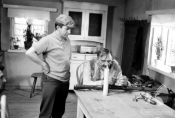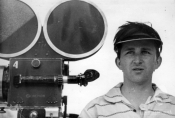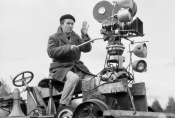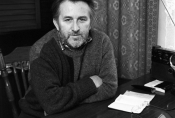Kazimierz Kutz
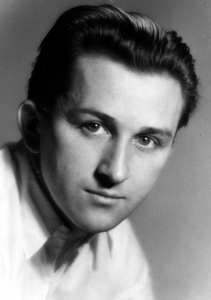
Film, theatre and television director, writer, journalist and educator. He was born on February 16, 1929, in Szopienice. A graduate of the State Film School in Łódź (1955). After the first year, he started working as an assistant lecturer at the Faculty of Literature under Professor Regina Dreyer and Film Dramaturgy under Professor Aleksander Jackiewicz. After graduation, he worked as an assistant to Andrzej Wajda on the set of Pokolenie/Generation (1954) and then was second director on the set of Kanał/Canal (1956).
He made his independent debut with Krzyż Walecznych/Cross of Valour (1958, Warsaw Mermaid), a feature film consisting of three short stories, set in wartime or the post-war reality. This film became one of the most important achievements of the Polish Film School, not main stream (Wajda, Andrzej Munk), but the side which was more personal, focused on the ordinary man rather than the epic story. He continued addressing the themes of war in Ludzie z pociągu/Night Train filmed three years later (award at Locarno), a penetrating psychological study of Polish society during the Nazi occupation, represented by train passengers detained by the Nazis and forced to pass a dramatic exam of their humanity. His response to Wajda’s Popiół i diament/Ashes and Diamonds was Nikt nie woła/Nobody’s Calling (1960), set just after the liberation; the poetic and nostalgic story of a young man attempting to seek refuge from the consequences of the war in the west of Poland, hoping to start life anew. In 1963, he also made another film, set just after the war in a provincial town – the intriguing Milczenie/Silence. It is the story of a young boy, disliked by residents because of his "otherness" and accused of killing the priest. Although there is no irrefutable evidence of his guilt, the local community have already passed their judgment. In his original film Ktokolwiek wie…/Whoever Knows ..., made three years later, he tells – in a rather unconventional form reminiscent of the New Wave – the story of a journalistic investigation into the sudden disappearance of a young girl. Kutz returned to the Polish Film School years later, making Straszny sen Dzidziusia Górkiewicza/The Terrible Dream of Dzidziuś Górkiewicz in 1993, in which he portrayed the fate of the hero of Scherzo alla polacca – the first novella of the famous Eroica directed by Munk. A streetwise man from Warsaw, an accidental insurgent of the Warsaw Uprising, after years of various, sometimes shady business, leads a quiet life as a countryside pensioner. Universally respected, seen as a man outside the system, he suddenly becomes a perfect candidate for the new mayor...
The greatest recognition, however, Kutz earned for his poetic ballads, full of lyricism and charm, the visually stunning Silesian films (in 1972-1976, he was the head of the "Silesia" Studio Film): Sól ziemi czarnej/Salt of the Black Earth set in the 1920s (1969, awards in Grenoble and Łagów), Perła w koronie/The Pearl in the Crown, set in the 1930s (1971, awards in Panama, Milan, Antwerp and Łagów) and the Paciorki jednego różańca/The Beads of One Rosary (1979, Golden Lions in Gdansk, awards in Karlovy Vary, Sao Paulo, Figueira da Foz), a moving story about an old Silesian married couple forced to relocate, as well as “supplements” to the famous triptych: Na straży swej stać będę/I Shall Always Stand Guard (1983), The Convert/Zawrócony (1994, Golden Lions in Gdynia, awards in Berlin, Moscow, Utrecht), and Śmierć jak kromka chleba/Death as a Slice of Bread (1994, awards in Gdynia and Łagów, Warsaw Mermaid), an attempt to reconstruct the most tragic events of martial law in Poland: the massive attack of the riot police and army troops against the striking miners.
Some of his films proved to be very popular with audiences, such as Pułkownik Kwiatkowski/Colonel Kwiatkowski (1995;, prize in Łagów, Golden Duck, Golden Ribbon), a scintillating story of a doctor who posed as a communist colonel to bring some order to the Polish post-war reality, and the television series Sława i chwała/Fame and Glory (1997), based on the famous, though somewhat forgotten, book by Iwaszkiewicz.
He is also a highly regarded teacher: in the years 1979-1982, he worked at the Department of Radio and Television at the University of Silesia. In 1986, he started teaching in the Directing Department of the Kraków Academy of Dramatic Arts. In 1981, he became president of the Silesian Film Society, which he co-founded. In 1990-1991, he was the head of the Krakow branch of Polish Television. In 1997-2007, and again from 2011, he was elected senator, serving as the Deputy Speaker of the Senate in the term 2001-2005, and in 2007-2011, he was an MP. Winner of the Wiktor Award for outstanding television personality (1992), the Konrad Swinarski Award for Lifetime Achievement in television (1993), The Eagle Award for Lifetime Achievement (2004), Platinum Lions for Lifetime Achievement in Film (2009) and many other prestigious accolades.
Jerzy Armata
Selected filmography
-
1958
CROSS OF VALOR
-
1960
NOBODY'S CALLING
-
1969
THE SALT OF THE BLACK EARTH
-
1971
THE PEARL IN THE CROWN
-
1979
BEADS OF ONE ROSARY
Articles
-
Bodiless Enemy
Rafał Marszałek
„Kwartalnik Filmowy” – Special Issue 2013: “Polish Film Scholars on Polish Cinema”
